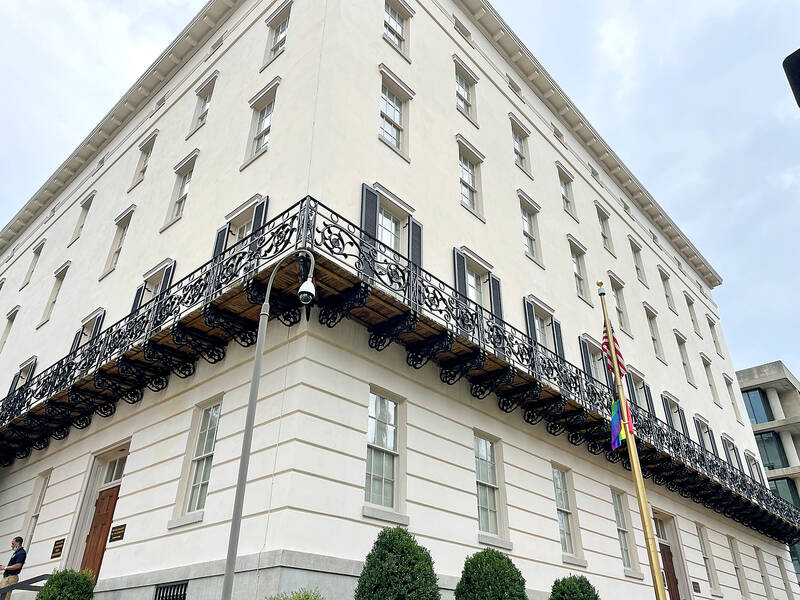Taiwan remains on the latest US report on foreign trade barriers, released on Monday by the Office of the US Trade Representative (USTR), just days before US President Donald Trump is set to announce reciprocal tariffs.
The section of the report on Taiwan, which remained largely similar to last year’s, raised concerns over barriers to imports of meat and automobiles, as well as questions over copyright issues.
Given the report’s timing, it could add to pressure on Taiwan, as well as other listed countries, as the office said in a statement that the findings "underscore President Trump’s America first trade policy and [his] 2025 trade policy agenda."

Photo: CNA
Although not yet confirmed, Taiwan is expected to be among the main targets of upcoming US reciprocal tariffs imposed on states referred to as the "dirty 15" by US Secretary of the Treasury Scott Bessent.
Other potential targets include Japan, the EU and China.
The report, submitted to Trump and the US Congress, said that despite a 2009 protocol reopening Taiwan’s market to US beef, Taipei continues to impose barriers on US beef and beef byproducts.
After detecting a case of bovine spongiform encephalopathy in 2003, Taiwan banned US beef, although the 2009 protocol reopened imports.
The USTR report said that some US beef offal products, although permitted under the protocol, remain subject to port-of-entry inspections in Taiwan, which it described as "onerous" and "not science-based."
Taiwan’s labeling requirements and maximum residue limits for ractopamine — a feed additive used in US pork — "inaccurately implied that there is a food safety concern with US pork products," it said.
The report also expressed dissatisfaction with Taiwan’s restrictions on imported US vehicles that meet US Federal Motor Vehicle Safety Standards.
The standards provide a level of safety equivalent to that of the UN Economic Commission for Europe’s 1958 agreement, which Taiwan has adopted, the report said.
The Ministry of Communications and Transportation introduced a cap on such imports in 2008 and reduced it to 100 units per model in 2021, before cutting it to 75 units per model in 2023, the report said.
Such a reduction could hinder US automakers from attracting consumers by periodically introducing unique new models, the report said.
It also raised concerns over online piracy, particularly unauthorized access to textbooks and copyrighted materials through on-campus digital platforms.
Despite several attempts by Taiwan to change the Copyright Act (著作權法), the USTR said that the pending amendments had loopholes and had made slow progress in being implemented, including some submitted to the legislature in October 2017.
In Taipei, the Office of Trade Negotiations yesterday said that the government would continue to communicate with the US.

‘SWASTICAR’: Tesla CEO Elon Musk’s close association with Donald Trump has prompted opponents to brand him a ‘Nazi’ and resulted in a dramatic drop in sales Demonstrators descended on Tesla Inc dealerships across the US, and in Europe and Canada on Saturday to protest company chief Elon Musk, who has amassed extraordinary power as a top adviser to US President Donald Trump. Waving signs with messages such as “Musk is stealing our money” and “Reclaim our country,” the protests largely took place peacefully following fiery episodes of vandalism on Tesla vehicles, dealerships and other facilities in recent weeks that US officials have denounced as terrorism. Hundreds rallied on Saturday outside the Tesla dealership in Manhattan. Some blasted Musk, the world’s richest man, while others demanded the shuttering of his

TIGHT-LIPPED: UMC said it had no merger plans at the moment, after Nikkei Asia reported that the firm and GlobalFoundries were considering restarting merger talks United Microelectronics Corp (UMC, 聯電), the world’s No. 4 contract chipmaker, yesterday launched a new US$5 billion 12-inch chip factory in Singapore as part of its latest effort to diversify its manufacturing footprint amid growing geopolitical risks. The new factory, adjacent to UMC’s existing Singapore fab in the Pasir Res Wafer Fab Park, is scheduled to enter volume production next year, utilizing mature 22-nanometer and 28-nanometer process technologies, UMC said in a statement. The company plans to invest US$5 billion during the first phase of the new fab, which would have an installed capacity of 30,000 12-inch wafers per month, it said. The

Taiwan’s official purchasing managers’ index (PMI) last month rose 0.2 percentage points to 54.2, in a second consecutive month of expansion, thanks to front-loading demand intended to avoid potential US tariff hikes, the Chung-Hua Institution for Economic Research (CIER, 中華經濟研究院) said yesterday. While short-term demand appeared robust, uncertainties rose due to US President Donald Trump’s unpredictable trade policy, CIER president Lien Hsien-ming (連賢明) told a news conference in Taipei. Taiwan’s economy this year would be characterized by high-level fluctuations and the volatility would be wilder than most expect, Lien said Demand for electronics, particularly semiconductors, continues to benefit from US technology giants’ effort

Minister of Finance Chuang Tsui-yun (莊翠雲) yesterday told lawmakers that she “would not speculate,” but a “response plan” has been prepared in case Taiwan is targeted by US President Donald Trump’s reciprocal tariffs, which are to be announced on Wednesday next week. The Trump administration, including US Secretary of the Treasury Scott Bessent, has said that much of the proposed reciprocal tariffs would focus on the 15 countries that have the highest trade surpluses with the US. Bessent has referred to those countries as the “dirty 15,” but has not named them. Last year, Taiwan’s US$73.9 billion trade surplus with the US